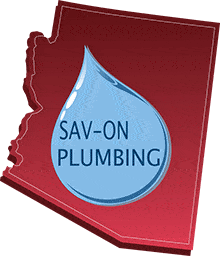The thought of a slab leak usually induces a chill down the spine of any homeowner because when you’re talking about excavating under a house to get to the leak, you’re usually talking about big money.
First and foremost, don’t push the panic button. With skilled professionals like Sav-On Plumbing, we can usually repair this type of leak without doing any damage to the foundation, tile floors or wood floors.
The most challenging part about a slab leak is finding out where it’s located. Sometimes, it’s pretty obvious: There’s a puddle or you’re seeing the floor bubble up in a certain area. Other times, you might see some discoloration wicking up the walls, or even a damp part of the carpet that can’t be attributed to a pet. When you call in the professionals, they’ll confirm the location and provide you and your insurance carrier with an itemized list and a timetable when you can expect your life to go back to normal.
The process they use is pretty straight-forward:
- Determine that you do in fact have a slab leak. Many times it is a leak in the wall or a water heater leak disguising itself as a slab leak.
- Locate exactly where the leak is under the foundation and where the pipe is in relation to the other plumbing in the ground and walls.
- In 90% plus times you have this type of leak, the best course of action is to eliminate the leaking pipe underground by “re-routing” the pipe thru the attic or ceiling thus eliminating the damaged pipe.
- Put back the drywall removed to reconnect the new pipe to the existing pipe in the walls. This is much cheaper and far less intrusive than jackhammering up a floor and then trying to match 30 year old tile or wood flooring.
How do slab leaks occur?
Here are some common reasons for a slab leak:
- Scale buildup in copper pipe over time: when this scale flakes off, it leaves a weak spot in the wall of the pipe that can develop into a leak.
- Expansion and contraction: Copper pipe expands and contracts due to the temperature of the water passing thru it; the wider the variation in temperature, the greater the expansion and contraction. This is why 85% of leaks under the foundation are hot water pipes.
- Construction debris in the trenches where the pipes are laid: a sharp object pressing against a copper pipe will eventually make a leak given enough time.
- Insulation failure: copper pipe is often fastened in place by wire and rebar. If the insulation fails and the pipe comes into direct contact with the rebar a leak will inevitably develop.
If you suspect you may have a slab leak, call for a professional evaluation. We will offer you solutions and options that you may otherwise not consider. Oftentimes, we are able to get your insurance company to cover most, if not all of the costs incurred in this type of repair.
